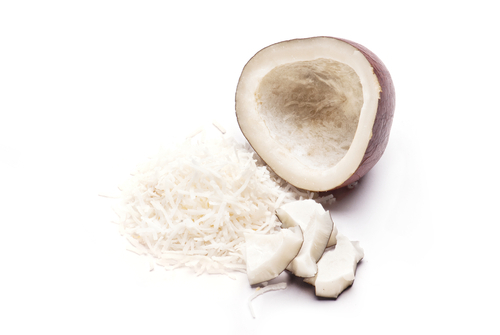Is Dried Coconut Bad For You?
Short answer
Dried coconut (copra) has many benefits, but one should be on the lookout for additives such as sodium, sugar, and sulfites that many commercial brands use.
Recommended Alternative
Overall beneficial to your health. Things rated a 'B' may have some harmful qualities to pay attention to.
View Full Grading System
Category 'A'
Very healthy and numerous health benefits. Side effects are rare. Things rated an 'A+' are typically necessary for survival (for example, water).
Very healthy and numerous health benefits. A few harmful qualities may be associated, but only under certain circumstances such as an allergic reaction.
Very healthy and numerous health benefits. Harmful qualities may be associated, but aren't usually serious.
It is important to note that even the best things in life can become bad in immoderate amounts. So, although something may be rated an 'A+', overconsumption/overdoing can bring unwanted effects.
Category 'B'
Very beneficial to your health. Things rated a 'B+' may have a few harmful qualities to pay attention to.
Overall beneficial to your health. Things rated a 'B' may have some harmful qualities to pay attention to.
More beneficial to your health than not. However, harmful qualities are most likely associated and shouldn't be overlooked.
The main difference between category 'A' and category 'B' is the harmful qualities typically present in 'B' items. Serious side effects are usually uncommon, but are still possible and should be taken note of.
Category 'C'
Both beneficial and harmful qualities associated. Things rated a 'C+' are typically a bit more on the beneficial side. Still, moderation is important.
A fairly even ratio of beneficial and harmful qualities. Moderation is important. Very general topics that can lean towards both sides of the spectrum will be placed here as well. Rice, for example, can be good or bad depending on the type.
More harmful than beneficial. Side effects are common, especially when consumed/done excessively. Moderation is very important.
Category 'C' usually denotes to both good and bad qualities. When it comes to this category, it is important to keep this word in mind: moderation.
Category 'D'
Harmful to your health. Although benefits may be associated, the bad most likely outweighs the good. Moderation is very important.
Harmful to your health. A few benefits may be associated, but the bad outweighs the good. Moderation is extremely important.
Harmful to your health. Very few, if any, benefits are present. Things in this category should be avoided as much as possible.
Category 'D' is typically for things that are more harmful than beneficial. While consuming/doing something unhealthy once in a blue moon shouldn't hurt, we definitely recommend eliminating 'D' items as a regular part of your routine/diet.
Category 'F'
Category 'F' is for things that fail to bring anything beneficial to the table, and are very harmful to your health. We recommend completely avoiding anything in this category. Long-term side effects of 'F' items are usually very serious.
Category 'N'
'N' stands for neutral. Things placed into this category are generally (a) neither good nor bad for you, or (b) lack the necessary evidence to reach any conclusions.
Long answer
Dried coconut, also known as copra, is coconut meat that has been grated and then dried with heat of at least 160 degrees Fahrenheit. It is important that dried coconut be made using this temperature (or higher) so that pathogens are killed. Fresh coconut has a short shelf life (lasting about 1-2 days after harvest) and is a very likely breeding ground for Salmonella. Not properly following industrial practice (such as "raw" dried coconut that some sellers try to peddle) can lead to the product being contaminated.
In and of itself, copra is good for you and your health. It contains a large amount of manganese, copper, and selenium. Manganese (along with zinc) helps copper do its duties of promoting iron absorption, producing collagen and red blood cells, and working as an antioxidant. Manganese is important for calcium absorption, energy metabolism, and regulating blood sugar levels. Selenium is a key component of selenoproteins, enzymes which support thyroid and immune system function.
While it's true that dried coconut has a lot of saturated fat (80% or more per ounce), it should be remembered that not only has saturated fat been cleared of much of its previous implication in causing cardiovascular disease, but much of the danger that it does pose is mitigated by dried coconut's high amount of fiber - nearly 50% per ounce in some brands.
While fresh dried coconut is good for you, the saturated fat content can catch up when excessively consumed, leading to obesity and increasing the risk of obesity-related diseases, such as type 2 diabetes and heart disease. Furthermore, if your diet is not normally high in fiber, the sudden influx of large amounts of fiber can lead to bloating, gas, and diarrhea. Lastly, it is important to keep in mind that many brands contain added sugars, sodium, and sulfites, which can quickly diminish many of the said benefits.
Possible short-term side effects
- bloating
-
diarrhea
-
flatulence
Possible long-term side effects
- obesity
-
type 2 diabetes
-
heart disease
Ingredients to be aware of
Benefits
- increases immunity and thyroid function
-
increases calcium absorption
-
helps regulate blood sugar
-
promotes colon and digestive health
-
promotes healthy red blood cell count
Healthier alternatives
Our Wellness Pick
(what is this?)
Terrasoul Coconut Chips
- Organic snack
- Raw Superfood
- Rich in nutrients
- Non-GMO
- Bulk value pack
Learn More!
Please turn your Ad Blocker off to see this content. Thank you!
Thank you for your feedback!
Written by Jeff Volling
Published on: 03-11-2016
Last updated: 12-01-2023
Thank you for your feedback!
Written by Jeff Volling
Published on: 03-11-2016
Last updated: 12-01-2023

 Approved by
Approved by 















